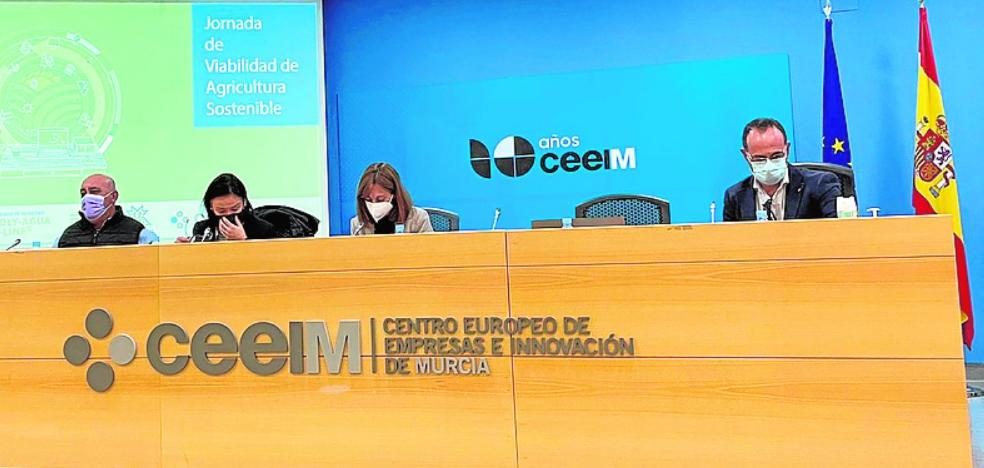Last week, the Federation of Agricultural Cooperatives of Murcia (Fecoam), together with the firm Biogreen, held the 1st Conference on the Viability of Sustainable Agriculture at the European Center for Business and Innovation in Murcia.
The objective of this meeting was to publicize the latest advances in the optimization of water resources and the presentation of different tools that are being successfully tested at the El Mirador Agricultural Demonstration Center, a second-tier cooperative in which they are put into practice. pilot projects for new systems as a preliminary step to their implementation on farms.
Thus, during the conference, which was opened by the General Director of Agriculture, Food Industry and Agricultural Cooperatives, María Remedios García, the positive effects through the use of retaining polymers, efficient water savings and fertilization were discussed first. Those in charge of the presentation were Pedro Mínguez, technical director of CDTA El Mirador, and Alberto Fuentes and Stephane Sánchez, manager and marketing director of the Biogreen company, respectively, who explained the operation and results of the Poly-Agua S-Line water retainer. .
For her part, Carmen Hernández, a Fecoam technician, spoke in her speech about “the importance of including retaining polymers in operational programs”, thereby promoting more sustainable agricultural practices that respect the natural environment, “key to the future of the agriculture of the Region”, remarked Hernández.
green future
In this sense, Carmen Hernández presented during her speech the legislation that governs European operational programs and which includes mandatory environmental measures and actions for member states. Thus, “Royal Decree 1179/18, which regulates the funds and operational programs in Spain, establishes in Annex IV the list of measures, actions, actions and concepts of eligible expenditure in the POs and the requirements of these measures. Measure 7 of said RD is aimed at environmental objectives and establishes a whole list of concepts”, explained the technician.
In addition to this, the national guidelines for the preparation of specifications regarding environmental actions establish the conditions for their application.
«In the face of the new approval of the National Strategy within the framework of the new CAP, Amopa has requested that the use of these techniques and products could be included. Thus, we have requested that the inclusion of the use of techniques such as the use of probiotics and humectants and moisture retainers be added as an eligible action within the future ‘list of environmental and climate measures’.
moisture retainer
One of the tools that is proving to be the most effective in terms of optimizing water and saving resources are moisture retainers such as the Poly-Agua S-line, developed by the company Biogreen.
“According to the FAO (Food and Agriculture Organization of the United Nations) “fresh water available per person has decreased by more than 20% in the last 20 years. Agriculture has an important role to play on the path to sustainability, given that irrigated agricultural production is responsible for more than 70% of global water withdrawals and 41% are not compatible with sustaining ecosystem services. Investment to improve water productivity will be key in order to address water shortages”, explain those responsible for the project.
«Biogreen Road is a company committed to contributing to the optimization of a resource as precious and scarce as water by developing products to save it in agriculture, golf courses and ornamental gardens. Biogreen Road has designed Poly-Agua S-Line to improve irrigation efficiency by reducing water stress in crops, minimizing water losses due to runoff and percolation, providing improvements in water management, production yields, environmental preservation and reducing the use of fertilizers», they emphasize from the company. As explained by those responsible, Poly-Agua S-Line is a superabsorbent that comes from a family of biodegradable macromolecules that helps preserve our natural resources.
«This product is a polymer that absorbs 340 times its weight in water and its only monomer is propanoic acid, so it does not have acrylamide. These molecules, when hydrated, generate electrical charges that, in addition to binding the water molecules, bind fertilizers and nutrients, which they make available to the absorbing roots. For this reason, the use of Poly-Agua S-Line allows an initial reduction of around 30% of fertilizers. Poly-Agua S-Line dissolves in water and is supplied through sprinkler or drip irrigation”, they conclude.
–


